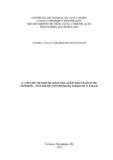| dc.contributor.advisor | Zamin, Angela Maria | |
| dc.creator | Santos, Andre Carlos Wichineski dos | |
| dc.date.accessioned | 2021-11-12T18:05:17Z | |
| dc.date.available | 2021-11-12T18:05:17Z | |
| dc.date.issued | 2021-08-16 | |
| dc.date.submitted | 2021 | |
| dc.identifier.citation | SANTOS, A. C. W. A copa do mundo de 2014 para além das páginas de esporte: análise de conteúdo da Folha de S. Paulo. 2021. 53 p. Trabalho de Conclusão de Curso (Graduação em Jornalismo) – Universidade Federal de Santa Maria, Frederico Westphalen, RS, 2021. | por |
| dc.identifier.uri | http://repositorio.ufsm.br/handle/1/22793 | |
| dc.description | Trabalho de conclusão de curso (graduação) – Universidade Federal de Santa Maria, Campus Frederico Westphalen, Curso de Jornalismo, RS, 2021. | por |
| dc.description.abstract | This study, based on the Journalism Theories of agenda-setting (CORREIA, 2011) and newsmaking (FERREIRA; DALMONTE, 2008; SILVA, 2014), observes how the leading Brazilian newspaper Folha de S. Paulo addressed the 2014 FIFA World Cup mega-event, held in Brazil, apart from the sport pages. The articles published by Folha between January and July 2014 were selected using the technique of constructed week or artificial week (BAUER, 2002), adapted to an artificial “fortnight”. Using the method of Content Analysis (BARDIN, 1977; HERSCOVITZ, 2007), we seek to understand the 2014 FIFA World Cup schedule operated by the newspaper outside the Sports editorial, specifically in the Power (politics) and World (international) sections. The specific objectives include: the discussion of Folha's coverage based on the theories of agenda-setting and newsmaking; the identification of scheduling and newsworthiness criteria present in journalistic texts of informative genre through Content Analysis and, finally, the analysis of the agenda constructed by Folha from the main subject and the current topics related to the World Cup, the presentation of informative texts (in terms of textual genre, position on the page, the presence of an image and the reporter's signature) and the sources used, as well as the dominant news values and their respective consequences. The analysis makes it possible to locate, through the schedule carried out, the political and social nature of the time which went through the sports mega-event. | eng |
| dc.language | por | por |
| dc.publisher | Universidade Federal de Santa Maria | por |
| dc.rights | Acesso Aberto | por |
| dc.rights | Attribution-NonCommercial-NoDerivatives 4.0 International | * |
| dc.rights.uri | http://creativecommons.org/licenses/by-nc-nd/4.0/ | * |
| dc.subject | Jornalismo | por |
| dc.subject | Agenda-setting | por |
| dc.subject | Newsmaking | por |
| dc.subject | Análise de conteúdo | por |
| dc.subject | Folha de São Paulo | por |
| dc.subject | Copa do mundo FIFA 2014 | por |
| dc.subject | Agenda-setting | eng |
| dc.subject | Newsmaking | eng |
| dc.subject | Content analysis | eng |
| dc.subject | 2014 FIFA world cup | eng |
| dc.title | A copa do mundo de 2014 para além das páginas de esporte: análise de conteúdo da Folha de S. Paulo | por |
| dc.type | Trabalho de Conclusão de Curso de Graduação | por |
| dc.degree.local | Frederico Westphalen, RS, Brasil. | por |
| dc.degree.graduation | Jornalismo | por |
| dc.description.resumo | Este estudo, com base nas Teorias do Jornalismo da agenda-setting (CORREIA, 2011) e do newsmaking (FERREIRA; DALMONTE, 2008; SILVA, 2014), observa como o jornal de referência brasileiro Folha de S. Paulo abordou o megaevento Copa do Mundo de Futebol FIFA de 2014, realizado no Brasil, para além das páginas de esporte. As reportagens publicadas pela Folha entre janeiro e julho de 2014 foram selecionadas por meio da técnica de semana construída ou semana artificial (BAUER, 2002), aqui adaptada para uma “quinzena” artificial. Utilizando-se do método da Análise de Conteúdo (BARDIN, 1977; HERSCOVITZ, 2007), buscamos compreender o agendamento da Copa do Mundo de Futebol FIFA de 2014 operado pelo jornal fora da editoria de Esporte, especificamente nas seções Poder (política) e Mundo (internacional), que integram o primeiro caderno. Os objetivos específicos abarcam: a discussão da cobertura da Folha a partir das teorias da agenda-setting e do newsmaking; a identificação de critérios de agendamento e de noticiabilidade presentes em textos jornalísticos de gênero informativo por meio de Análise de Conteúdo e, por fim, a análise da agenda construída pela Folha a partir do assunto principal e da atualidade das pautas relacionadas ao mundial de futebol, da apresentação dos textos informativos (quanto ao gênero textual, à posição na página, à presença de imagem e a assinatura do repórter) e das fontes acionadas, bem como dos valores-notícia dominantes e seus respectivos desdobramentos. A análise permite localizar, pelo agendamento realizado, o cunho político e social à época que atravessou o megaevento esportivo. | por |
| dc.publisher.country | Brasil | por |
| dc.publisher.initials | UFSM | por |
| dc.subject.cnpq | CNPQ::CIENCIAS SOCIAIS APLICADAS::COMUNICACAO::JORNALISMO E EDITORACAO | por |
| dc.publisher.unidade | UFSM Frederico Westphalen | por |



